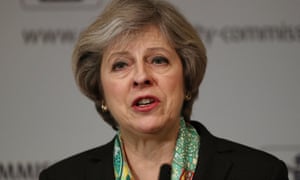
When I was 17, I (too) briefly set up a website to help young people with mental health issues. It was my small way of trying to help others who might be having a tough time, as I had. One of the things I mentioned was my wish that all schools should have a counsellor or mental health trained staff member attached, and how this could avert mental health crises in young people which might go on to affect them for life. That was 10 years ago.
Today, Theresa May has given a speech promising just that. Shouldn’t I be thrilled? Well, on the face of it; yes. The prime minister has promised that all secondary schools will receive staff mental health training – a third in 2017, and the remainder over the next two years. The government has also said it will look at how schools can work more closely with mental health staff working in the NHS, and this is in addition to a report expected this spring.
As well as this much needed focus on young people’s mental health, May has announced plans for more workplace support, the expansion of “digital mental health services” and more investment in community services.
All of this is good. All of it. The problem is this: when it comes to mental health, the Tories are both the boy who cried wolf and the wolf in sheep’s clothing.
The government talks about mental health as if it is a zeitgeist issue, or a crisis it has just discovered – and expects to be praised for discovering. But the mental health crisis in the UK is not new, and has been exacerbated significantly because of its policies, despite David Cameron’s promises last year of “a mental health revolution”.
How galling it is for May to talk of mental health as a “hidden injustice in this country” when for years doctors, mental health professionals, advocacy groups, charities, service users and campaigning politicians have been warning of the situation. How sickening, when over the last parliament frontline services have been left in ribbons, for May to speak of wanting to use the “power of government as a force for good” when the state of mental health care in this country, under her party’s watch, means people are travelling 300 miles for beds; 62% of mental health trusts require improvement; ligature points are found on wards; children are detained in police cells (which, to the government’s credit, is soon to be banned); waiting list targets are being missed; units closed.
In fact, as the Liberal Democrats’ health spokesperson Norman Lamb has been consistent in reiterating, millions of pounds earmarked for children’s mental health is diverted by clinical commissioning groups (CCGs) to other services, to help with the wider NHS crisis. Freedom of Information requests found 64% of CCGs used funds for other purposes and that 57% of CCGs plan to reduce their spending on child mental health in 2017.
Every time I see the £1.4bn figure trotted out that the Tories pledged to children and adolescent mental health care by 2020, I have the urge to scream. It’s as big a smudge as the £350m figure that was plastered on to the Vote Leave bus.
The maths does not add up. Just as it doesn’t add up when Jeremy Hunt talks about a seven-day NHS while not increasing the number of doctors. The take-up for psychiatry posts in particular is one of the lowest (as with emergency medicine).
That’s not even the full, dismal picture. According to NSPCC figures, a fifth of children referred to mental health services are denied access to help. This all too frequently leads to a situation in which children (and adults) have to reach their lowest point before help is available.
As for May’s pledge to increase the (tiny) £15m into community services, it’s a fantastic idea. Especially when GPs and A&E units are under such pressure and community initiatives are anecdotally effective. But a) this will not be adequate all of the time – these services cannot entirely replace secondary care, and b) as former shadow mental health minister Luciana Berger has said perhaps it would have been better if children’s centres and outreach services hadn’t been cut.
In fact, as the Liberal Democrats’ health spokesperson Norman Lamb has been consistent in reiterating, millions of pounds earmarked for children’s mental health is diverted by clinical commissioning groups (CCGs) to other services, to help with the wider NHS crisis. Freedom of Information requests found 64% of CCGs used funds for other purposes and that 57% of CCGs plan to reduce their spending on child mental health in 2017.
Every time I see the £1.4bn figure trotted out that the Tories pledged to children and adolescent mental health care by 2020, I have the urge to scream. It’s as big a smudge as the £350m figure that was plastered on to the Vote Leave bus.
The maths does not add up. Just as it doesn’t add up when Jeremy Hunt talks about a seven-day NHS while not increasing the number of doctors. The take-up for psychiatry posts in particular is one of the lowest (as with emergency medicine).
That’s not even the full, dismal picture. According to NSPCC figures, a fifth of children referred to mental health services are denied access to help. This all too frequently leads to a situation in which children (and adults) have to reach their lowest point before help is available.
As for May’s pledge to increase the (tiny) £15m into community services, it’s a fantastic idea. Especially when GPs and A&E units are under such pressure and community initiatives are anecdotally effective. But a) this will not be adequate all of the time – these services cannot entirely replace secondary care, and b) as former shadow mental health minister Luciana Berger has said perhaps it would have been better if children’s centres and outreach services hadn’t been cut.
The Tories are the world champions of words and not actions. I cannot tell you how pleased May’s team seem to be with the fact that in her first speech as prime minister she talked about mental health, as if in that single sentence she rolled back the years of cuts. So all of this is great – if it happens, and the precedent isn’t there.
We should all be watching, and holding the government to account on this. May’s words are to be welcomed, as are Hunt’s, when he is around and speaks well. But we are in danger of being lulled into security by the walls of stigma surrounding mental health being brought down, while the help available washes away. All this positive talk belies the fact that frontline services are decimated and those in need of real help are suffering, and at length. And that’s the problem with building something up when you’ve knocked it down so vigorously: it takes a long time.
[Source:-The guardian]


